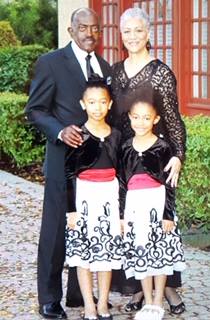AARP Hearing Center


In honor of Black History Month, AARP California is encouraging you to pass on your stories, your knowledge and your love as part of our month-long focus on family legacy. Throughout the month we will be highlighting Californian grandparents and their efforts to share stories and build legacy with their grandbabies. This week we interviewed Arthur and Lana Rasberry, aka Papa and Nani, of Fairfield about their relationship with 7-year-old Bryce and 5-year-old Riley.
What brings you the most joy out of being a grandparent?
Our eldest daughter was in her late thirties when our first granddaughter was born. We wanted to be grandparents for a long time, so the joy of witnessing her birth and holding her was overwhelming. Now that we have two granddaughters, we feel that our lives are even richer and more meaningful. Friends always told us that grandparenting was unmatched, and it is true. The unconditional love, big bear hugs, sweet kisses, and verbal expressions of affection are priceless. We always get a special feeling when we hear the girls squeal with delight and excitement when they arrive at our door or when we visit their home or go on an outing together. The ordinary stresses that are attached to parenting are minimal because we get to do the periodic fun things, share moments of wisdom, and indulge their whims.
What are some of your favorite activities you like to do with your grandchildren?
Some of our favorite activities that we do with our granddaughters are holiday baking and crafts, gardening, visiting neighborhood playgrounds, amusement venues, and the library. Another favorite activity is helping them with lessons on abcmouse.com. They love for us to be the customers when playing ‘restaurant’ at the play kitchen set up for them in our home. “Papa” and “Nani” also become the babysitters for their baby dolls, and the servers during dress up tea parties. Reading to them or having the seven-year old read to us is a nightly ritual when they spend the weekend.
Many grandparents fear that Black History is being lost because today’s youth don’t know the stories of those on whose shoulders they stand. Why is it important for you to share family and cultural stories with the next generation?
Our children grew up hearing about family history and stories, along with learning about historic and local figures in Black History. They engaged in conversations with their grandparents and relatives who lived through some of the history. So quite naturally, we have continued the tradition with our grandchildren. They need to know that we were not just slaves and servants, but also educators, scientists, artists, engineers and astronauts. The rich landscape of our African roots is notable in much of today’s children’s literature. Our little grandchildren are exposed to books and magazines, movies and television that focus on people that look just like them.
H ow do you share family and cultural stories with your grandchildren?
Probably the easiest way we have started conversations or imparted knowledge of our family is by looking through old photo albums, sharing who is in family photos placed throughout our home or having conversations with other relatives. The children’s natural curiosity sparks questions that lead to vignettes of family history or memorable stories that have been passed down through the generations. We have also invested in collecting official postage stamps of notable African American historical figures and events. The little ones have learned to place the stamps in the assigned trays housed in a case. The oldest one commented that she wants us to teach her more about the people, and why they were selected to be on a U.S. stamp.
What does “legacy” mean to you?
Legacy means to continue sharing one’s heritage with the next generation, and to strive to maintain it for the future generations. It is the act of passing down oral knowledge, as well as photo and digital archives of our family tree, genetics, history makers, talents and achievements.































































